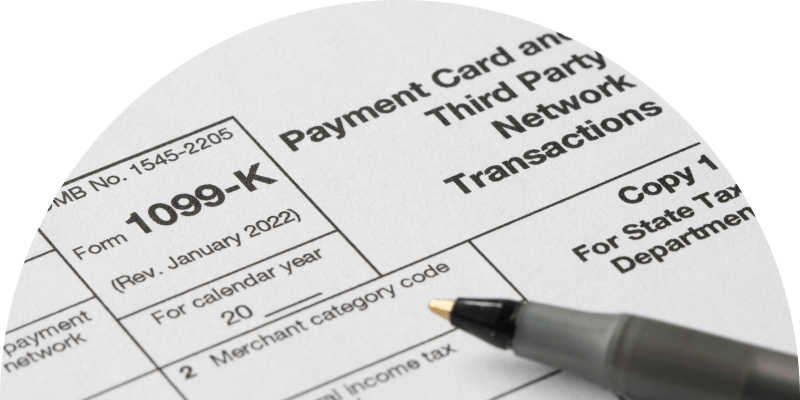- Find an office
-
File Your Taxes
 Find a Location
Find a Location -
Resolve Tax Issues
 Resolve Tax Issues
Resolve Tax IssuesResolve Tax Issues
-
Tax Resources
 See all Tax Help
See all Tax HelpTax Tools
Tax Tips & Resources
- Where's My Refund
- Refund Advance
- Hiring Local Jobs!
- Tax Services
- Promotions & Coupons
- Careers
- Search
- Contact Us
- Feedback
-
 Log in | Sign up
Log in | Sign up

JH Accounts
|
|
Oh no! We may not fully support the browser or device software you are using ! To experience our site in the best way possible, please update your browser or device software, or move over to another browser. |
SELF-EMPLOYMENT
Venmo 1099-K: New IRS rules 2024

Do you get paid on Venmo or PayPal? If so, understanding IRS Form 1099-K is crucial for reporting accurately and avoiding penalties. In this article, we’ll explain why you receive a 1099-K, how the IRS treats Venmo and PayPal transactions, the new reporting thresholds for 2024, and how to report your Venmo income accurately on your tax return
Key takeaways
- The IRS considers income from Venmo, PayPal, Apple Pay, and other third-party transactions taxable income, just like any other earnings.
- Form 1099-K, Payment Card and Third Party Network Transactions, reports payments you’ve received through third-party networks like Venmo to ensure accurate income reporting for tax purposes.
- For 2024, the IRS has set the reporting threshold at $5,000, meaning you will receive a 1099-K form if you earn more than $5,000 through Venmo or PayPal.
- The threshold was previously $20,000 and was set to change to $600. However, the IRS delayed this lower threshold until 2025, implementing a $5,000 threshold for 2024 instead.
- Even if you do not receive a 1099-K form, you must report all income from Venmo on your tax return.
How does the IRS treat Venmo and PayPal transactions?
The IRS views income that is reported from Venmo and PayPal transactions as taxable income, just like any other earnings. When you make money through these platforms, it’s considered part of your income. This applies whether you’re a small-business owner, freelancer, or just selling items online.
Received a 1099-K from Venmo? Book an appointment now to maximize your return.
Why is this important? The IRS wants to ensure everyone reports their full income, no matter the source.
When you use Venmo, PayPal, Apple Pay, or another third-party network for business transactions, the platform tracks the payments and sends you a 1099-K if your earnings exceed $5,000 in 2024 (previously, the threshold was $20,000; more on that later).
What is a 1099-K form?
IRS Form 1099-K is a tax document that reports any payments you received through third-party networks like Venmo, PayPal, or Apple Pay. If you receive more than $5,000 in 2024 through these platforms, you’ll likely get a 1099-K. This form helps the IRS keep track of the income you earn through digital payment apps to ensure accurate reporting.
Whether you’re a small-business owner or someone who occasionally sells items online, if you use Venmo or PayPal to accept payments that total $5,000 or more, you’ll need your 1099-K when you file your taxes.
Do you have to pay taxes on Zelle transactions?
Yes, you must pay taxes on Zelle business transactions; however, it operates differently from Venmo and PayPal when it comes to tax reporting. Unlike these other payment platforms, Zelle does not issue a 1099-K form because it doesn’t process payments itself. Instead, Zelle acts as a middleman, directly transferring both business and personal funds between bank accounts.
This doesn’t mean you’re off the hook. You must still report all business income you’ve received through Zelle on your tax return. The IRS expects you to keep accurate records of these transactions just like any other income.
Tax reporting changes for Venmo and PayPal in 2024
The IRS announced a new reporting threshold for Venmo and PayPal for 2024 of $5,000. To understand the significance of this change, you need to know a bit of history.
Back in 2021, the IRS lowered the reporting threshold for Venmo, PayPal, Apple Pay, and other third-party transactions from $20,000 all the way down to $600. However, when 2022 came around, the IRS announced that it would delay the $600 change until 2024. Now that it’s 2024, the IRS has once again announced a delay in the $600 threshold to 2025, as well as a change to the existing threshold to $5,000 for the interim.
This means that if you receive more than $5,000 through Venmo or PayPal this year, you'll get a 1099-K form from these platforms.
This change is a step towards making tax reporting more manageable for small-scale sellers and businesses, while still ensuring that everyone is accurately reporting significant income.
This means that, unless your transactions exceed $5,000, you won’t receive a 1099-K from Venmo or PayPal. However, even if you don’t get a 1099-K, you’re still responsible for reporting all income you received through these platforms on your tax return.
How to report Venmo 1099-K on your tax return
When you receive a 1099-K form from Venmo, PayPal, or another third-party network, it’s important to accurately report the income on your tax return. Here’s how.
- Gather your documents
Start by collecting all your 1099-K forms and any other income records. This includes payments you’ve received through Venmo for goods or services. Also, have records of any business expenses you’ve incurred.
- Identify your total income
The 1099-K form will show the total amount you received through Venmo over the year. Make sure this matches your records. If there are discrepancies, review your transactions to understand why.
- Report on the correct tax form
You’ll typically report this income on Schedule C, Profit or Loss From Business. Enter the total from your 1099-K in the income section along with any other non-third-party business income you received.
- Deduct business expenses
On Schedule C, you can also deduct any business-related expenses. This reduces the income you need to pay tax on. Keep detailed records of all expenses, such as supplies, equipment, and fees associated with using Venmo.
- Review your return
Double-check all entries for accuracy. Ensure the amounts on your tax return match those on your 1099-K forms and other records.
Frequently asked questions about Venmo and income tax
Do you have to pay taxes on Venmo transfers?
Yes, you must pay taxes on Venmo transfers. The IRS considers Venmo payments as taxable income, just like any other earnings. Whether you’re a freelancer, a small-business owner, or someone who sells items online, you need to report this income on your tax return. Personal transfers between friends or family, like splitting a dinner bill or paying rent, are not taxable.
What is the $600 rule on Venmo?
The $600 rule refers to the threshold for receiving a 1099-K form; however, this IRS has delayed this threshold until 2025. For 2024, the threshold is $5,000. If you receive more than $5,000through Venmo for business transactions in a year, Venmo is required to send you a 1099-K form.
Do I have to report 1099-K if it is less than $20,000?
Yes, you must report all Venmo income you make, regardless of the amount. The previous $20,000 threshold for receiving a 1099-K form has been lowered to $5,000 for 2024 and $600, starting in 2025. The IRS expects you to report all earnings.
How do I file taxes if I get paid through Venmo?
Gather your 1099-K form and any other records of income received through Venmo and elsewhere. Include the total amount from your 1099-K as taxable income. If you’re a sole proprietor or freelancer, use Schedule C to report both your business income and to deduct your business-related expenses. Business expenses reduce your taxable income. Double-check all entries to ensure they match your records and the 1099-K form before filing your return.
Still have questions or concerns about reporting Venmo income? Work with a Jackson Hewitt Tax Pro. Our experts can guide you through the process, ensuring your taxes are filed accurately and efficiently. Reach out today for personalized help and peace of mind. We’re open all year to answer your questions, help you plan for a smooth tax season, and more.
Read more articles from Jackson Hewitt
Get a Tax Pro
Our Tax Pros are ready to help you year-round. Find an office near you!

Still need tax help?
We’re here for you! Find a nearby location today.
Because trust, guarantees, convenience & money all matter

-
TRUSTED GUARANTEES.
Be 100% certain about your money & your taxes, year after year.
-
NATIONAL PRESENCE. LOCAL HEART.
We’re in your neighborhood & inside your favorite Walmart store.
-
40+ YEARS. 65+ MILLION RETURNS.
The kind of trusted expertise that comes with a lifetime of experience.





